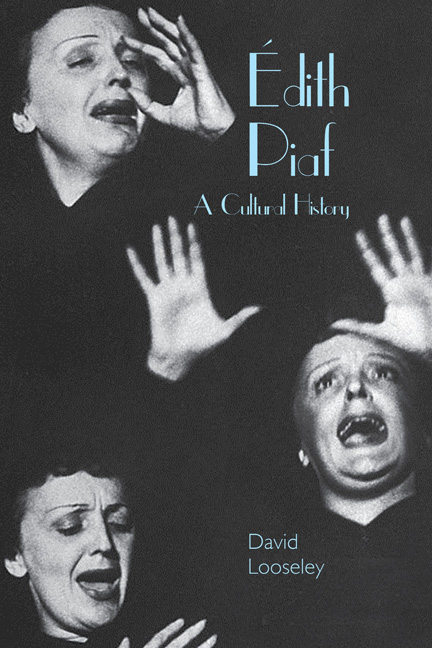5 - High art, low culture
Piaf and la chanson française
from Part II - Piaf and Chanson
Summary
At a conference in Italy on the influence of the French ‘poetic chanson’, the introductory rubric began:
In 2013 we will celebrate the centenary of the birth of Charles Trenet, who is unanimously considered to be the precursor of the French singer-songwriters [auteurs-compositeurs-interprètes] […]. In his wake during the 1950s and 1960s, authors such as Brassens, Brel, Ferré, Gainsbourg, Ferrat, Aznavour, Moustaki, Barbara, Bécaud, Vian […] have disseminated la chanson française across the world and have contributed to an extraordinary encounter— indeed, a fusion, of music and literature.
‘Alongside’ these great ‘authors’ but separated from them came the most significant performers (interprètes) of French chanson: Gréco, Montand and Piaf. These two groups together, the rubric went on, were responsible for a memorable era of profound renewal in chanson.
The document's deceptively value-free distinction between historic singers and historic singer-songwriters raises an especially intriguing question in Piaf's case. She wrote close to 90 songs, many of which she sang herself. And, as we saw, lyrics were what interested her most: ‘Creating a song means bringing a character alive. How can this be achieved if the words are mediocre even if the music is good?’ So why isn't she classed as an auteur-compositeur-interprète (ACI)? The hyphens here are actually more eloquent than they look. They signify a deeper unity in the talents at stake, an ‘integrity’ in the dual sense of sincerity and wholeness. They discreetly connote an ‘auteur’, a single, unifying creative vision. In France particularly, where the concept of auteurism began with film criticism, ‘author-composer-interpreter’ carries a rhetorical gravitas that ‘interpreter’ alone doesn't. Likewise, ‘author’ and ‘text’ are used in French where English more naturally uses ‘lyricist’ and ‘lyrics’. Singer-songwriters like Trenet, Brel, Brassens and Ferré enjoy a special status because they have a double legitimacy within French republican culture: their work is both poetic and popular, aesthetically demanding yet democratic. They thereby represent within the broader category ‘chanson’ an elite subgenre variously called the text-based song (chanson à texte), the author song (chanson d'auteur) or the poetic song (chanson poétique).
Piaf, on the other hand, despite those 90-odd songs, is generally classed as an ‘interpreter’, which here causes her to be placed in the company of Montand and Gréco, neither of whom wrote their own material. This could of course be because her own songs just aren't considered ‘poetic’ enough.
- Type
- Chapter
- Information
- Édith PiafA Cultural History, pp. 97 - 112Publisher: Liverpool University PressPrint publication year: 2015



